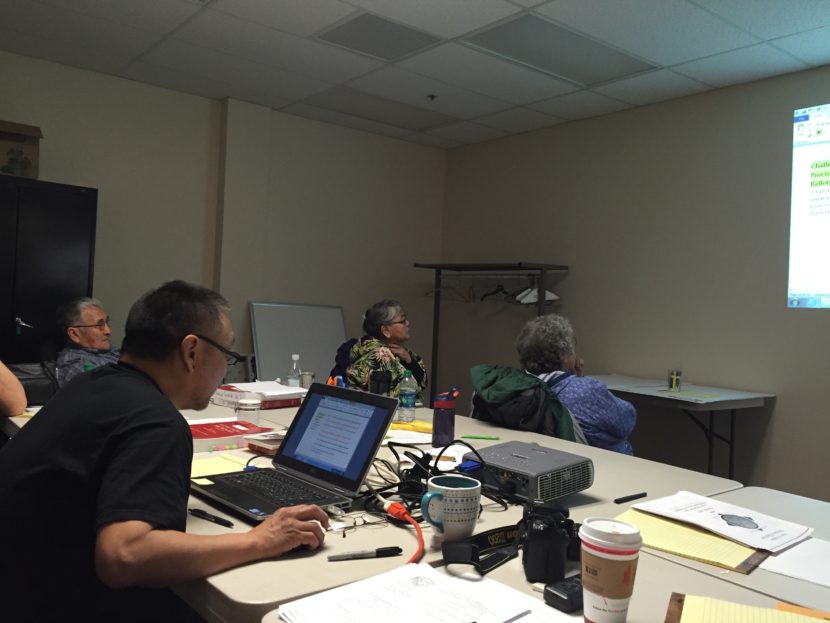
The state’s Division of Elections is required to translate ballots and create an elections glossary in six dialects of Yup’ik and also Gwich’in. Those are the terms of a lawsuit settled last year by Lt. Gov. Byron Mallott. But that process isn’t easy.
Think about these words — “candidates for elected office are running for a seat.” What image pops in your head? Retired Yup’ik professor Oscar Alexie says not a political event.
“I’m thinking of people like Bernie Sanders and Donald Trump and all those guys at the race line waiting for someone to say ‘Go!’” And whoever gets to the chair first is the boss, Alexie said.
Alexie is part of the eight-person team that’s trying to translate election materials into Yup’ik. He said it’s not easy because the words need to mean something in Yup’ik, not just be literal translations from the English. One word in English — “candidate” — ends up being a phrase in Yup’ik.
But technical ballot language in English is dense. Something like “candidate statement” isn’t straightforward.
“So we’re going to come across a number of statements in the election that are official,” explains Language Assistance Compliance Manager Indra Arriaga to the group of a translator.
She tries to get across the exact legal meaning of the term – it isn’t obvious – and it technically matters that the statement is in writing. But when the explanation gets translated into Yup’ik, it becomes redundant.
“It’s almost like saying, you know, this is what he said: ‘That is his bicycle with two wheels,’” Alexie interjects and the group laughs. “You’re adding too much to it like where it’s almost like you are trying to talk to fools, and I don’t like being talked to like that, you know,” Alexie said.
Arriaga quickly explains that’s not what she meant, and others jump in with solutions to ease the frustration and refine the translation. They know they are working together as a team.
The process of translating 300 words into six dialects requires lots of cooperation between the translators and Arriaga as they discuss the nuances both of the English terms and the different dialects. It is lengthy and arduous. But for Mike Toyukuk, “It’s really good. I like it.”
Toyukuk is one of the plaintiffs in the lawsuit that led to the language assistance settlement.
Thanks in part to him ballots will be translated into the Yup’ik dialects, Gwich’in and eventually Inupiaq. Elections workers will be trained to help voters understand the materials in their own languages. He said, through interpreter John Toopetlook, translating the elections glossary and all state and federal ballots will solve a major problem for some rural communities.
“When he was working with the lawyers,” Toopetlook said. “He and they found out a lot of Natives would go vote and not understand what they were voting on.”
As a result, one community in the Yukon didn’t get funding for a new school. People didn’t know to vote in favor of the bond, Toyukuk recalls.
Division of Elections Director Josie Bahnke, who is Alaska Native, said the translation process is doing more than just making basic voting rights accessible to Alaska Native communities.
“We’re building a bridge of trust and faith between the Alaska Native community and the State of Alaska,” said Bahnke. “And I think you can see that in the way that we’re sitting down and pairing up. The whole process and the interaction between our division and the translators has been pretty powerful to see and watch.”
Bahnke said the group of translators will meet for a second time in the summer. Initially, they thought the group would only have to meet once. The division plans to finish the glossary of election terms in time for the primaries in August. Each of the 29 communities involved with the legal settlement will also have sample ballots translated into the local languages and people will be able to listen to translations on a computer.
